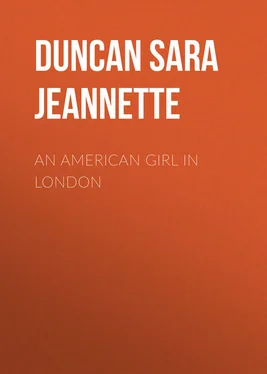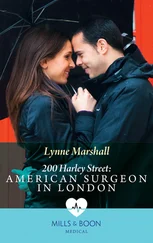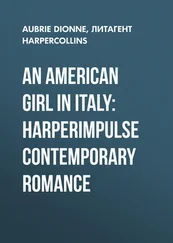Sara Duncan - An American Girl in London
Здесь есть возможность читать онлайн «Sara Duncan - An American Girl in London» — ознакомительный отрывок электронной книги совершенно бесплатно, а после прочтения отрывка купить полную версию. В некоторых случаях можно слушать аудио, скачать через торрент в формате fb2 и присутствует краткое содержание. Жанр: foreign_antique, foreign_prose, на английском языке. Описание произведения, (предисловие) а так же отзывы посетителей доступны на портале библиотеки ЛибКат.
- Название:An American Girl in London
- Автор:
- Жанр:
- Год:неизвестен
- ISBN:нет данных
- Рейтинг книги:4 / 5. Голосов: 1
-
Избранное:Добавить в избранное
- Отзывы:
-
Ваша оценка:
- 80
- 1
- 2
- 3
- 4
- 5
An American Girl in London: краткое содержание, описание и аннотация
Предлагаем к чтению аннотацию, описание, краткое содержание или предисловие (зависит от того, что написал сам автор книги «An American Girl in London»). Если вы не нашли необходимую информацию о книге — напишите в комментариях, мы постараемся отыскать её.
An American Girl in London — читать онлайн ознакомительный отрывок
Ниже представлен текст книги, разбитый по страницам. Система сохранения места последней прочитанной страницы, позволяет с удобством читать онлайн бесплатно книгу «An American Girl in London», без необходимости каждый раз заново искать на чём Вы остановились. Поставьте закладку, и сможете в любой момент перейти на страницу, на которой закончили чтение.
Интервал:
Закладка:
As the door closed behind me I heard Mrs. Portheris's voice on the landing. 'Margaret and Isabel,' it said, 'you may come down now!'
'Ware to, miss?' said the driver.
'Hôtel Métropole,' said I. And as we turned into Piccadilly a little flutter of torn white paper went back on the wind to Mrs. Portheris. It was Miss Purkiss's address.
After lunch I made careful notes of Mrs. Portheris, and then spent half an hour in the midst of my trunks, looking in the Board and Lodging' column of the 'Morning Post' for accommodation which promised to differ as radically as possible from Miss Purkiss's.
V
MY principal idea was to get away as soon as possible from the Métropole. So long as I was located there I was within the grasp of my relation; and as soon as she found out my insubordination in the matter of her advice, I had no doubt whatever that my relation would appear, with Miss Purkiss, all in rusty black, behind her – a contingency I wished to avoid. Miss Purkiss, I reflected, would probably be another type, and types were interesting, but not to live with – my relation had convinced me of that. And as to Mrs. Portheris herself, while I had certainly enjoyed what I had been privileged to see of her, her society was a luxury regarding which I felt that I could exercise considerable self-denial. I did not really contemplate being forced into Miss Purkiss and Upper Baker Street by Mrs. Portheris against my will, not for a moment; but I was afraid the situation would be presented on philanthropic grounds, which would be disagreeable. Miss Purkiss as a terror I felt equal to, but Miss Purkiss as an object of charity might cow me. And Miss Purkiss in any staying capacity was not, I felt, what I came to Great Britain to experience. So I studied the columns of the 'Morning Post' diligently for a haven of refuge from Miss Purkiss.
I found it difficult to make a selection, the havens were so very different, and all so superior. I believe you talk about the originality of American advertising. I never in my life saw a newspaper page to compare in either imagination or vocabulary with the one I scanned that day at the Métropole. It seemed that I could be taken all over London, at prices varying from one 'g.' to three 'gs.' per week, although the surprising cheapness of this did not strike me until I had laboriously calculated in dollars and cents the exact value of a 'g.' I know now that it is a term of English currency exclusively employed in Bond Street, Piccadilly, Regent and Oxford Streets – they never give you a price there in any other. And the phrases descriptive of the various homes which were awaiting me were so beautiful. 'Excellent meat breakfast,' 'a liberal and charmingly-refined home,' 'a mother's devoted supervision,' 'fresh young society,' 'fashionably situated and elegantly furnished,' 'just vacated by a clergyman,' 'foreign languages understood' – which would doubtless include American – 'a lofty standard of culture in this establishment.' I wondered if they kept it under glass. I was struck with the number of people who appeared in print with 'offerings' of a domiciliary nature. 'A widow lady of cheerful temperament and artistic tastes offers – ' 'The daughter of a late Civil Servant with a larger house than she requires offers – ' This must have been a reference put in to excite sympathy, otherwise, what was the use of advertising the gentleman after he was dead? Even from the sympathetic point of view, I think it was a mistake, for who would care to go and settle in a house the minute the crape was off the door? Nobody.
Not only original advertisements of the kind I was looking for, but original advertisements of kinds I wasn't looking for, appealed to my interest and took up my time that afternoon.
'Would any one feel disposed to lend an actress five pounds?
'Temporary home wanted, with a family of quiet habits, in a healthful neighbourhood, who can give best references, for a Persian cat.' 'An elderly country rector and his wife, in town for a month's holiday, would be glad of a little pleasant society.'
'A young subaltern, of excellent family, in unfortunate circumstances, implores the loan of a hundred pounds to save him from ruin. Address, care of his solicitors.' 'A young gentleman, handsome, an orphan, of good education and agreeable address, wishes to meet with elderly couple with means (inherited) who would adopt him. Would make himself pleasant in the house. Church of England preferred, but no serious objection to Nonconformists.'
We have nothing like this in America. It was a revelation to me – a most private and intimate revelation of a social body that I had always been told no outsider could look into without the very best introductions. Of course, there was the veil of 'A. B.' and 'Lurline,' and the solicitors' address, but that seemed as thin and easily torn as the 'Morning Post,' and much more transparent, showing all the struggling mass, with its hands outstretched, on the other side. And yet I have heard English people say how 'personal' our newspapers are!
My choice was narrowed considerably by so many of the addresses being other places than London, which I thought very peculiar in a London newspaper. Having come to see London, I did not want to live in Putney, or Brixton, or Chelsea, or Maida Vale. I supposed vaguely that there must be cathedrals or Roman remains, or attractions of some sort, in these places, or they would not be advertised in London; but for the time being, at any rate, I intended to content myself with the capital. So I picked out two or three places near the British Museum – I should be sure, I thought, to want to spend a great deal of time there – and went to see about them.
They were as much the same as the advertisements were different, especially from the outside. From the outside they were exactly alike – so much so that I felt, after I had seen them all, that if another boarder in the same row chose to approach me on any occasion, and say that she was me, I should be entirely unable to contradict her. This in itself was prejudicial. In America, if there is one thing we are particular about, it is our identity. Without our identities we are in a manner nowhere. I did not feel disposed to run the risk of losing mine the minute I arrived in England, especially as I knew that it is a thing Americans who stay here for any length of time are extremely apt to do. Nevertheless, I rang the three door-bells I left the Métropole with the intention of ringing; and there were some minor differences inside, although my pen insists upon recording the similarities instead. I spent the same length of time upon the doorstep, for instance, before the same tumbled and apologetic-looking servant girl appeared, wiping her hands upon her apron, and let me into the same little dark hall, with the same interminable stairs twisting over themselves out of it, and the smell of the same dinner accompanying us all the way up. To be entirely just, it was a wholesome dinner, but there was so much of it in the air that I very soon felt as if I was dining unwarrantably, and ought to pay for it. In every case the stair-carpet went up two flights, and after that there was oilcloth, rather forgetful as to its original pattern, and much frayed as to its edges – and after that, nothing. Always pails and brushes on the landings – what there is about pails and brushes that should make them such a distinctive feature of boarding-house landings I don't know, but they are. Not a single elevator in all three. I asked the servant-girl in the first place, about half-way up the fourth flight, if there was no elevator? 'No, indeed, miss,' she said: 'I wishes there was! But them's things you won't find but very seldom 'ere. We've 'ad American ladies 'ere before, and they allus asks for 'em, but they soon finds out they ain't to be 'ad, miss.'
Читать дальшеИнтервал:
Закладка:
Похожие книги на «An American Girl in London»
Представляем Вашему вниманию похожие книги на «An American Girl in London» списком для выбора. Мы отобрали схожую по названию и смыслу литературу в надежде предоставить читателям больше вариантов отыскать новые, интересные, ещё непрочитанные произведения.
Обсуждение, отзывы о книге «An American Girl in London» и просто собственные мнения читателей. Оставьте ваши комментарии, напишите, что Вы думаете о произведении, его смысле или главных героях. Укажите что конкретно понравилось, а что нет, и почему Вы так считаете.












